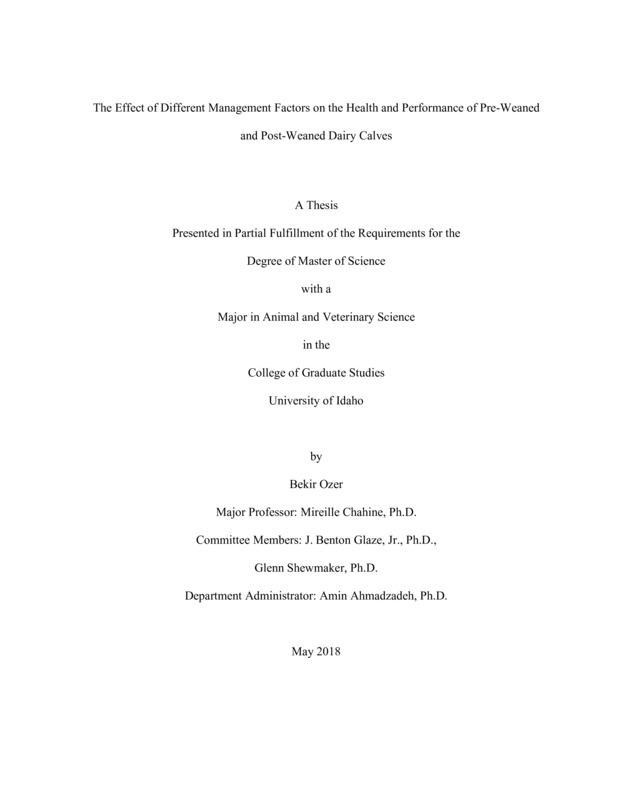The Effect of Different Management Factors on Health and Performance of Pre-weaned and Post-Weaned Dairy Calves
OZER, BEKIR. (2018-05). The Effect of Different Management Factors on Health and Performance of Pre-weaned and Post-Weaned Dairy Calves. Theses and Dissertations Collection, University of Idaho Library Digital Collections. https://www.lib.uidaho.edu/digital/etd/items/ozer_idaho_0089n_11386.html
- Title:
- The Effect of Different Management Factors on Health and Performance of Pre-weaned and Post-Weaned Dairy Calves
- Author:
- OZER, BEKIR
- Date:
- 2018-05
- Embargo Remove Date:
- 2019-11-15
- Keywords:
- colostrum health performance
- Program:
- Animal and Veterinary Science
- Subject Category:
- Animal sciences
- Abstract:
-
ABSTRACT
The main purpose of the work described in this thesis is to identify management strategies for maximizing IgG levels in calves on modern dairies. It is well established that 25 to 35 % of dairy cows on US dairies must be replaced annually to maintain herd size and improve genetics (Harris and Shearer, 2005). The cost of raising dairy heifers increases if inadequate management results in a higher than normal morbidity and/or mortality. Colostrum management has a very large impact on dairy calf health due to the fact that calves are born without significant number of immunoglobulins (antibodies). The objectives of these researches were 1) determine the effect of adding a serum derived colostrum supplement to maternal colostrum and its effects on serum immunoglobulin concentration in calves, health and performance of pre-weaned and post-weaned dairy calves, 2) Determine the effect of quantity and frequency of colostrum feeding on serum immunoglobulin concentration, health parameters, and growth in Holstein calves, 3) Determine the correlation between total serum protein in calves and first lactation milk performance.
Adding a supplement to maternal colostrum did not achieve any positive effect on performance and health parameters of dairy calves. In the second study results suggest that, feeding Holstein calves 2 separate feedings of maternal colostrum will improve passive transfer and might lead to some health benefits. The effect of colostrum feeding quantity and frequency on RS needs to be investigated further. In the third study results shows that, In the first lactation, calves that had TSP below 5.4 mg/d produced 10,551 ± 230 kg, those with TSP between 5.4 and 6.4 mg/dl produced 10,499 ± 229 kg, and those with TSP above 6.4 mg/dl produced 10,445 ± 230 kg. There was no relationship (P = 0.13) between TSP and future milk production.
- Description:
- masters, M.S., Animal and Veterinary Science -- University of Idaho - College of Graduate Studies, 2018-05
- Major Professor:
- CHAHINE, MIREILLE
- Committee:
- GLAZE, BENTON; SHEWMAKER, GLENN
- Defense Date:
- 2018-05
- Identifier:
- OZER_idaho_0089N_11386
- Type:
- Text
- Format Original:
- Format:
- application/pdf
- Rights:
- In Copyright - Educational Use Permitted. For more information, please contact University of Idaho Library Special Collections and Archives Department at libspec@uidaho.edu.
- Standardized Rights:
- http://rightsstatements.org/vocab/InC-EDU/1.0/

